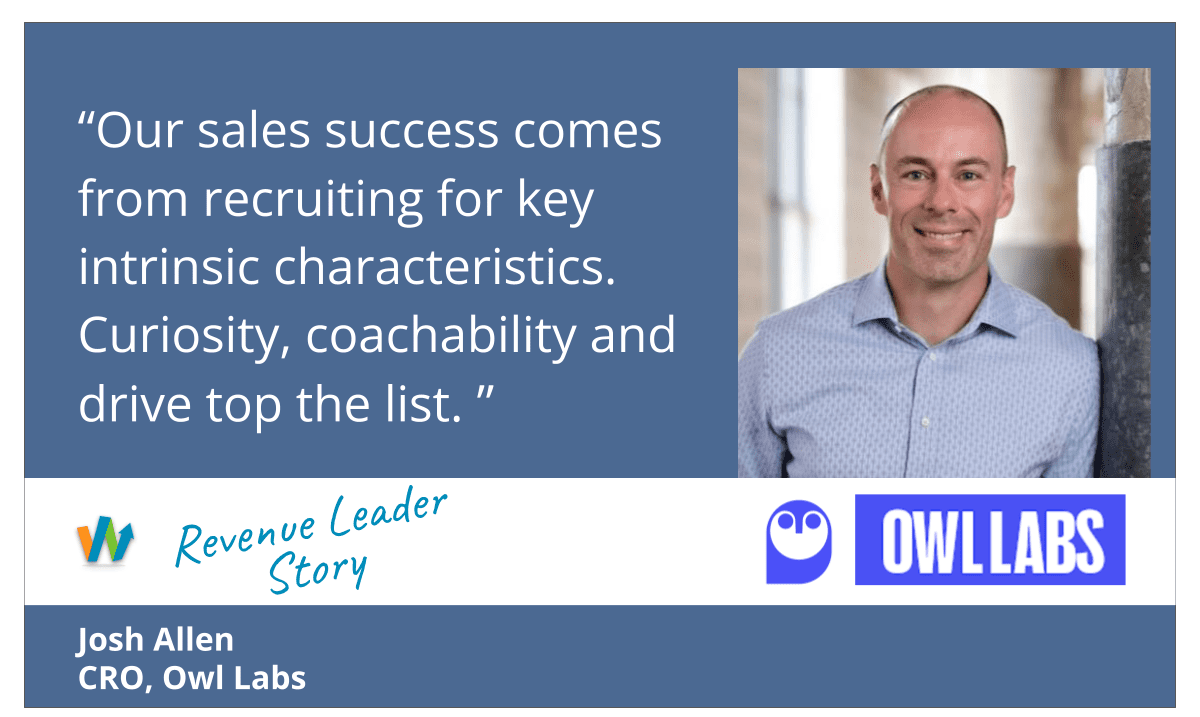 What matters most in building a top sales team – recruiting or skills training?
What matters most in building a top sales team – recruiting or skills training?
“Our sales success comes from recruiting for the right intrinsic characteristics,” says Josh Allen, Chief Revenue Officer at Owl Labs. “Sales process, messaging and negotiation are skills that can be taught. Curiosity, coachability and drive – those are more about how someone is wired as a human being and are very difficult to teach.”
A strong process to recruit for intrinsic characteristics helped Owl Labs build a top sales team in 12 short months. Josh and his colleagues recruited 14 new team members with only one miss, a 92% success rate which is well above the industry average of 65%. Additionally, all but two of these recruits were on quota in six months, an 86% hit rate vs. an industry average of 60%.
I recently spoke to Josh about his recruiting strategy – developed across revenue leadership roles at Owl Labs, LogMeIn, Drift and CarGurus. Here were his key practices.
Practice 1: Identify Core Characteristics
“It is really important to have an agreed-on set of core characteristics to focus recruiting,” Josh says. “We have seven characteristics we want to see candidates demonstrate in the recruiting process. The most important are curiosity, drive and coachability. Others include empathy, integrity, problem-solving, and resilience.”
Clearly identified core characteristics helps Josh and team make the recruiting process more objective. Candidates and candidate interviews can blur together. Scoring candidates against the same core characteristics shortly after an interview makes it easier to evaluate strengths and gaps for each candidate and supports direct candidate comparison.
Practice 2: Build Good Behavioral Questions
“Identifying core characteristics is a starting point,” Josh explains, “but we also need strong behavioral questions. Behavioral questions allow a candidate to directly demonstrate intrinsic characteristics. They are a practical way to evaluate whether intrinsic characteristics are present or not.”
Josh, as it turns out, is a master at behavioral questions. He has really clear, crisp questions for all seven core characteristics. Some of my favorite include these:
- On integrity: What was a recent conflict with a peer? How did you resolve it?
- On problem-solving: If a customer came back to you and no longer wanted the product or service they had purchased, how would you respond?
- On coachability/self-awareness: When I reach out to your references, what are they going to say is your biggest opportunity for improvement?
Practice 3: Norm the Recruiting Process
At Owl Labs, intrinsic characteristics are the most important of four buckets for candidate evaluation. The other three are cultural fit, sales skill, and performance in prior roles. Many companies develop recruiting rubrics to norm candidate evaluation across all participants in the recruiting process. Owl Labs takes a different approach.
“We recruit in a team of four,” Josh says “I learned at LogMeIn and CarGurus that recruiting results are best when each person becomes an expert in one area. Each of our four areas for candidate evaluation can have a dozen or more important questions. If you master one area, it is a lot easier to see the difference between good and great in a candidate.”
A lot has been written over the last decade about the impact of targeted skills coaching on sales team performance. Josh and Owl Labs’ success in building a top team is a good reminder that other factors have a big impact. Even more important to sales performance than skills coaching is evaluating the quality of candidates ‘raw materials’ in your recruiting process.
